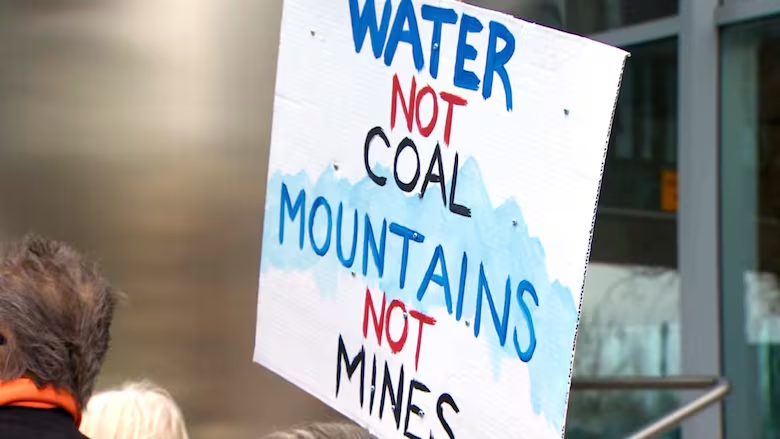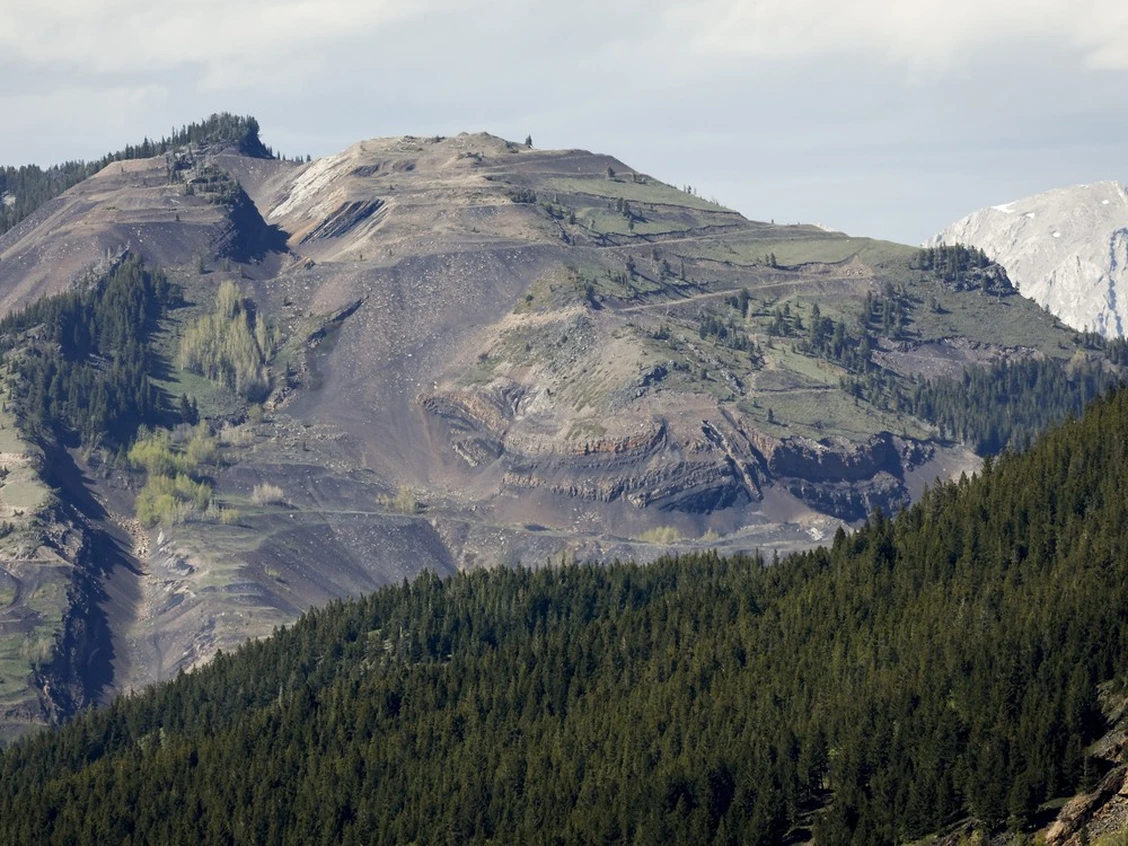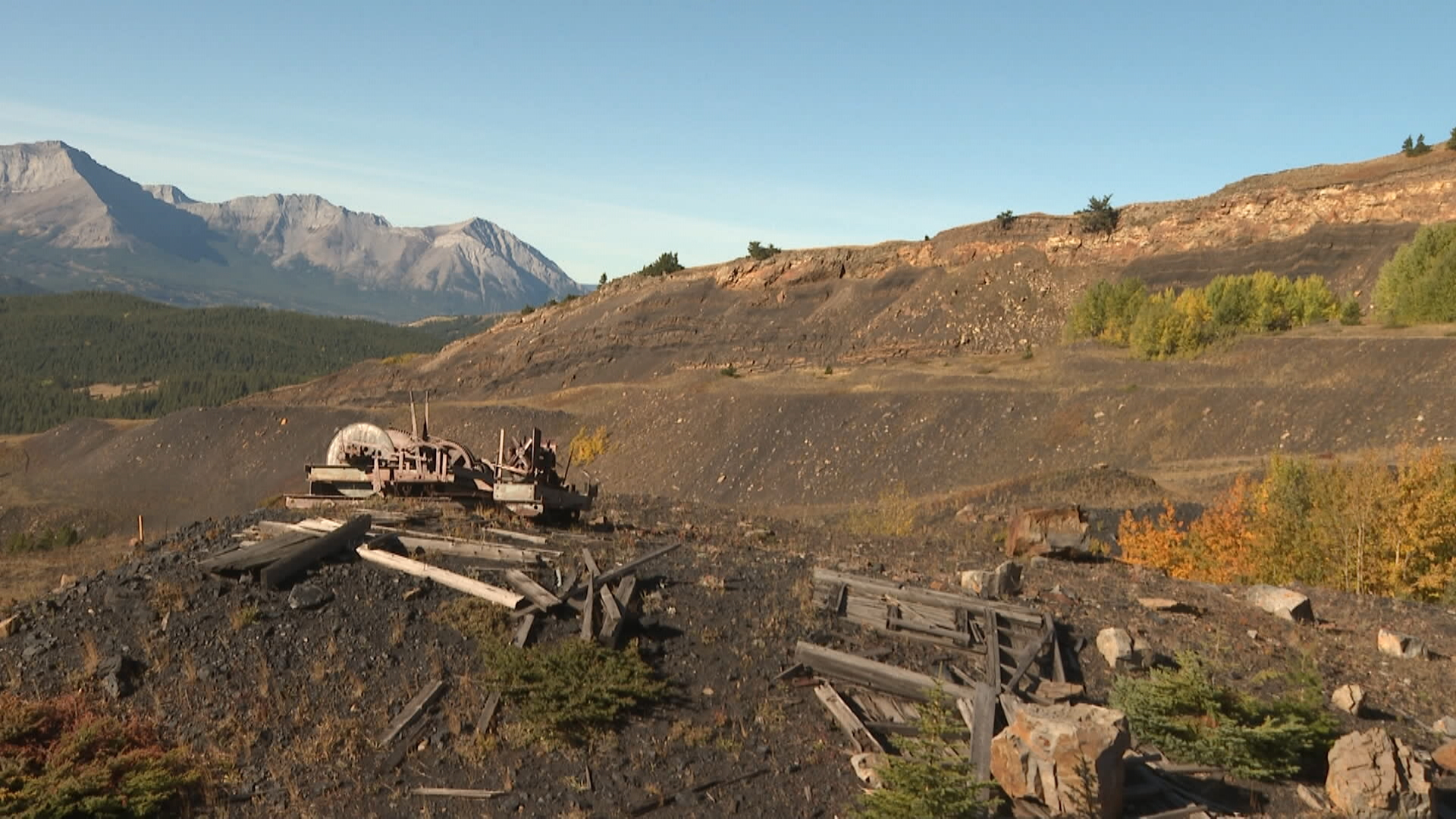Grassy Mountain coal mine hearings met by protests in Calgary
Dozens of protesters gathered outside the Alberta Energy Regulator (AER) offices in downtown Calgary as the second round of public hearings regarding the contentious Grassy Mountain coal mine kicked off Tuesday morning.
The energy regulator is holding the hearings to review exploration permits submitted by Northback Holdings, the company behind the proposed coking coal mine in the M.D. of Ranchland, just north of Crowsnest Pass.
The first round of hearings was held in Pincher Creek in early December.
Contamination of the Old Man River watershed, water shortages, potential impacts to southern Alberta agricultural producers, and damage to the environment surrounding the mine were among the concerns expressed by demonstrators.
“I don’t think [the Alberta government] has listened to us. I don’t think they’ve studied the reports … They have their overlord, it appears, dictating to them what they should be doing. They’re not listening to Albertans, and particularly the ones along the drainage of the Old Man River,” said Jackie Chalmers, the founder of the Chinook Watershed Society.
The hearings are the last opportunity for public input before the energy regulator decides whether Australian-owned Northback Holdings Corp. can move forward with a temporary exploratory drilling program and acquire a licence to divert water to the project.

The project was previously rejected by the federal government in 2021, citing adverse effects “on surface water quality, including from selenium effluent discharge.”
Crowsnest Pass residents recently voted in favour of the project in a non-binding referendum, citing the economic boost it could bring to the community.
“We were able to help them understand that we can indeed meet all the regulatory requirements put in place to protect the safety of Albertans, residents, the water and the environment,” Rina Blacklaws, spokesperson for Northback, said in an interview.
The company says the exploration program would use water from previously mined end-of-pit lakes and would not be connected to nearby bodies of water.
Kathleen Ganley, the MLA for Calgary-Mountain View who attended today’s protest, said she’s not sure the issue can be described as a simple trade-off between jobs and the environment.
“I don’t think the economics on this project are that good, because what we’re talking about is potential impacts to our water and land for generations. And we’re also talking about a relatively minor amount of profit or royalty to the people of Alberta compared to the potential cost.”
Third-generation rancher Lance Loree said those costs could come at the expense of his very livelihood.
“I’m an organic farmer, I don’t know. I don’t think coal dust is gonna do much for the organic certification. You know, it’d be pretty easy to lose a market there,” he said.
Loree is also concerned there isn’t enough fresh water to go around, once you factor in what the mine would need to operate.

Irrigators in southern Alberta had to cut their allocations last year in response to the year-on-year drought that has plagued that part of the province particularly.
Contamination of those water sources, especially by selenium, a pollutant that leaches from coal mines, is another worry.
“Our water will be poisoned by selenium because there is no scientific, verifiable way to remove selenium from the wash of the coal,” said Chalmers.
“This could destroy the ag producers.”
Selenium can produce deformities, nerve damage and reproductive failure in fish and birds, and remains in the environment long after its original source has stopped emitting.
If Northback can open up its mine, it has vowed to minimize environmental disruptions and impacts, but top experts have said there is no effective treatment to remove something like selenium from mining wastewater.

In an interview with CBC News in December, Alberta’s Agriculture Minister R.J. Sigurdson reassured farmers that the government wouldn’t move forward with any policies that would have a negative impact on the sector.
“We have one of the best regulators in the world within the AER and anybody that would be looking at any kind of production surrounding coal would have to come forward with technologies and solutions that wouldn’t impact water and make sure that they deal with … removing any selenium from the water,” he said.
“It would be a very high bar for anybody looking to revitalize that site.”
Under what the government is calling the Alberta Coal Industry Modernization Initiative, set to be in place by late 2025, the province said it would allow coal mining to take place if it met certain standards.
New coal mining proposals would be required to use techniques that use “best water practices and prevent adding selenium into waterways.”
But the new rules would not apply to the Grassy Mountain project, because the Alberta Energy Ministry has classified it as an “advanced” coal project.
The energy regulator’s public hearing is expected to continue tomorrow.
Grassy Mountain News
Alberta coal mining moratorium lifted to protect taxpayers from lawsuits, premier says

EDMONTON — Alberta Premier Danielle Smith says the province had taxpayers in mind when it decided to lift a ban on new coal exploration and development on the eastern slopes of the Rocky Mountains last week.
Speaking to reporters Tuesday, Smith cited pending lawsuits against the province filed by five coal companies arguing they are owed more than $15 billion combined in lost revenues and sunk costs.
“We have to take that seriously, and we have to make sure that the taxpayers are protected,” Smith said.
Alberta repealed its decades-old coal policy and issued new leases in 2020, only to put nearly all new projects on ice less than two years later after a storm of public pushback.
The sudden freeze on coal exploration and development meant companies that took heed of the government’s policy direction and purchased new leases for potential mining found themselves stuck with land they couldn’t use.
Last week, Energy Minister Brian Jean sent a letter to the Alberta Energy Regulator directing the moratorium on new coal development be lifted, allowing previously frozen projects to proceed through the regulatory process.
Jean’s office said Monday in a statement that lifting the moratorium doesn’t mean the government has declared open season for coal mining, as critics and conservationists suggest.
His office said the energy regulator will need to keep in mind the goals of the government’s new coal policy, which Jean announced in December, as it reviews new projects.
The policy direction includes a ban on certain types of coal mining techniques, such as open-pit mining, as well as a requirement that companies show how they can prevent toxic selenium from leaching into watersheds.
“We’re bringing through a better, more robust policy, and so that’s part of the reason why we put that forward,” said Smith, adding the policy addresses concerns Albertans shared after the previous policy was rescinded.
NDP Leader Naheed Nenshi said the United Conservative Party government put the province in the position of choosing between exposing itself to environmental or legal risks.
“That ridiculous mistake of lifting (the existing coal policy) and then reversing it is what led to these lawsuits,” Nenshi said. “So now the premier has reversed it again because of the lawsuits caused by the UCP’s own incompetence.”
Meanwhile, Smith said accessing Alberta’s stock of metallurgical coal would be a good thing.
“You just cannot make wind turbines and solar panels without metallurgical coal,” she said.
Grassy Mountain News
Hearings conclude on Grassy Mountain Coal Project
The Alberta Energy Regulator has concluded a three-day hearing in which they will determine if the Grassy Mountain coal mining project will go ahead. The proposal has faced immense backlash for its environmental risks, some coming from a former Lethbridge Mayor.
Grassy Mountain News
Future of Grassy Mountain coal mine now in the hands of the Alberta Energy Regulator
After three days of contentious hearings, punctuated by large and noisy opposition rallies, the fate of Northback Holding’s proposal to explore for coal in the eastern slopes of the Rocky Mountains now hinges on a decision from the Alberta Energy Regulator.
The Australian-owned company’s proposal has triggered condemnation from a wide cross-section of Albertans concerned about the environmental and health effects on the Old Man River and downstream communities, including ranchers, landowners, some First Nation members and environmentalists.
The first round of hearings into the project– which would be located just north of Blairmore, in the Crowsnest Pass — took place in Pincher Creek in early December 2024.
The second round of hearings, which began on Tuesday, wrapped up on Thursday at the AER offices in Calgary.
Carrying signs with such slogans as “protect our children’s heritage” and shouting things like “water, no coal,” dozens of protesters gathered outside the final day of hearings on the project that has already previously been rejected by both federal and provincial environmental review panels.
“They’ve opened up a denied project, denied for very good reasons, reasons that have not gone away, in fact reasons that have arguably gotten worse, especially in terms of water, and drought issues,” said protester Rebecca Brown.

“The facts speak for themselves,” said protester Laura Laing. “To us the answer is pretty straight forward. We have examples of what coal mining would mean in our headwaters and it’s devastating.”
Northback Holdings spokesperson Rina Blacklaws said the company expects the Alberta Energy Regulator “to make a decision based on evidence.”
Northback has maintained the environmental regulations it would be forced to operate under are amongst the strictest in the world and that modern coal mining practices are very different than those of the past.
On Thursday, a presentation from a landscape ecologist suggested the project would have significant and lasting impacts on water, sustainable beef and recreation in the area for generations to come.
But despite the widespread opposition to the project, opponents expect it will be given the go-ahead by the AER.
A decision is expected within 90 days.
Grassy Mountain News
Hearing on Grassy Mountain coal project resumes in Calgary
The Alberta Energy Regulator (AER) resumed public hearings on Tuesday regarding the proposed Grassy Mountain coal mining project, according to a CTV News report.
Northback Holdings, the company behind the development, is seeking approval for three applications: a coal exploration programme, a deep drill permit, and a temporary licence to divert water.
“We’re confident that the global demand for seaborne metallurgical coal will remain robust for decades,” said Stacey Brown, Chief Operating Officer of Northback Holdings, in the report.
She noted the company’s significant financial investment in the site, which she estimated at $1 billion.
She also stressed the company’s commitment to minimising environmental impact in doing the project.
Brown assured stakeholders that planned activities would use existing infrastructure. The company intends to drill 14 holes on 11 existing drill pads on Crown land, alongside 19 additional holes on 12 drill pads located on private land owned by Northback.
All equipment entering the site will be inspected and cleaned before entering, Brown said in the CTV News report, addressing concerns raised by the Municipal District (MD) of Ranchlands #66 about the spread of invasive weeds.
Opposition against Grassy Mountain coal mining project
The project has sparked strong opposition from environmental advocates, local residents, and some Indigenous groups. On Tuesday, approximately 200 protesters gathered outside the AER’s downtown Calgary offices to voice their concerns.
“People are not for this drilling. The people are not for these mines,” said protester Byrdie Loyer in the report.
“It is our leaders and our chief that are behind this, and they’re bought out.”
“It’s not a benefit to Albertans. It’s an Australian mining company that will be taking the profits out of our country,” Andreasen said. She also warned about potential water and air quality impacts, adding, “We as Albertans haven’t had a chance to be consulted on this.”
Legal and regulatory scrutiny
The hearing also included cross-examination from lawyers representing the MD and the Livingstone Landowners Group. Michael Niven, legal counsel for the MD, questioned the necessity of further exploratory drilling, given the extensive drilling history at Grassy Mountain.
There have been 517 exploratory holes drilled on Grassy Mountain since the 1970s, including 83 drilled between 2013 and 2016 by Riversdale, a related company, Niven noted, according to the report. He criticised the project’s rationale, likening it to outdated wartime strategies.
“I’m able to remember that Vietnam War protest back in the late 1960s and the Nixon strategy of bombing for peace. That’s what this sounds like to me,” said Niven.
Northback maintained that it has made efforts to address stakeholder concerns. “Northback believes it has been receptive and responsive to and has appropriately considered the concerns and interests of all stakeholders to the applications,” Brown said.
Residents support Grassy Mountain coal project
A November referendum in Crowsnest Pass revealed that 71 per cent of residents supported the project, but the vote was non-binding, reported CTV News. However, the site is located within the jurisdiction of the MD, where opinions may differ.
Supporters also argue that the Grassy Mountain coal mining project could create jobs and highlight improved mining regulations.
The Alberta government has refrained from commenting on the hearing.
“We respect the Alberta Energy Regulator’s independent jurisdiction on making any decisions on applications for projects,” stated a spokesperson for Energy and Minerals Minister Brian Jean’s office.
The hearings, which began in December in Pincher Creek, are expected to conclude later this week. Evidence from the Piikani Nation and Stoney Nakoda Nation is scheduled for Wednesday. The AER panel will have 90 days to issue its decision, noted CTV News.
Grassy Mountain News
Public hearing for Grassy Mountain coal mine resumes
A public hearing for the controversial Grassy Mountain coal mining project resumed in Calgary Tuesday.
Northback Holdings provided evidence to the public as to why it believes the Alberta Energy Regulator should approve three applications for a coal exploration program, a deep drill permit and a temporary licence to divert water.
Northback’s chief operating officer, Stacey Brown, says the company has made significant investment at the site, about $1 billion so far.
“We’re confident that the global demand for seaborne metallurgical coal will remain robust for decades,” said Brown.
“These activities will have minimal impact on the surrounding environment.”
An Alberta Energy Regulator (AER) will decide whether the company behind the project, Northback Holdings, can start drilling.
Northback Holdings says it wants to drill 14 holes on 11 separate drill pads that exist on crown land. Another 12 drill pads and 19 drill holes are on private land, owned by the company.
Officials told the hearing the company would not disturb new areas, but rather access the sites through existing trails.
It adds that it will address any environmental concerns, as it understands the concerns of citizens, some Indigenous groups and nearby landowners.
“Northback believes it has been receptive and responsive to and has appropriately considered the concerns and interests of all stakeholders to the applications,” said Brown.
She adds that all equipment entering the site will be inspected and cleaned before entering, to avoid invasive weeds, a concern raised by the Municipal District of Ranchlands #66.
The company was cross-examined by lawyers representing the MD and the Livingstone Landowners Group.
Michael Niven, representing the MD, questioned why the company needs to drill even more holes on Crown land.
He points to 517 exploratory holes drilled on Grassy Mountain since the 1970s, 83 of which were drilled between 2013 and 2016 by Riversdale, a related company of Northback.
“I’m able to remember that Vietnam War protest back in the late 1960s and the Nixon strategy of bombing for peace,” said Niven.
“That’s what this sounds like to me.”
A non-binding referendum in November by Crowsnest Pass residents voted 71 per cent to approve the application, however, it is taking place in the MD.
A spokesperson for Energy and Minerals Minister Brian Jean’s office says it will not respond to the ongoing hearings this week.
“We respect the Alberta Energy Regulator’s independent jurisdiction on making any decisions on applications for projects,” read the statement.
“It would be inappropriate for the government to comment on this process.”
The hearing initially started in early December in Pincher Creek, before breaking for the holidays.
The Oldman River near the project flows directly through the Piikani Nation. Chief and council note they have some concerns about the mine but are in favour of drill testing.
Around 200 protesters gathered outside the AER downtown offices to protest the project.
“People are not for this drilling. The people are not for these mines,” said protester Byrdie Loyer.
“It is our our leaders and our chief that are behind this, and they’re bought out.”
Bethe Andreasen, another protester, says there is a laundry list of reasons as to why the applications should not be approved.
“First, it’s financial. It’s not a benefit to Albertans,” she said.
“It’s an Australian mining company that will be taking the profits out of our country. Second, all kinds of environmental reasons, it’s going to damage our water, and certainly it’s going to tear up a mountain.”
Andreasen adds that the company did not consult all parties impacted by the possible drilling.
“There’s going to be air quality issues with the dust. And the third is for societal reasons, we as Albertans haven’t had a chance to be consulted on this,” said Andreasen.
The hearings will continue Wednesday and Thursday. The Piikani Nation and Stoney Nakoda Nation will provide their evidence on Wednesday.
The AER panel will have 90 days to come back with its decision.
With files from CTV’s Karsen Marczuk
Grassy Mountain News
Alberta government announces tougher new coal rules, Grassy Mountain project still on the table
“We will not put our water at risk in any way. Protecting our waters will be a top priority when considering new mining projects. The Foothills are the headwaters for most of southern Alberta and these waters will be protected. Any existing or new coal project in the Foothills will need to prevent additional selenium leaching into our waters. This can be done. Industry knows how to do it, and we will make sure industry does whatever is necessary to keep selenium out of our water.”
“We will protect the Foothills. We are not allowing mountaintop removal mining, not ever. We will not allow any new open-pit coal mines in the Foothills. Let me repeat, no new open-pit coal mines in the Foothills.”
However, this does not mean there won’t be any open-pit mines like the proposal for Grassy Mountain in southern Alberta, near Blairmore.
“The Grassy mine proposal, of course, was an exempt mine going forward but there are absolutely no exceptions in relation to selenium. And the AER (Alberta Energy Regulator) is, of course, an arm’s length independent regulator and we’re going to make sure that they will be dealing with all of the new mine applications as well as the existing ones and hold them to the highest possible standard. And the water they are using right now is from a contained pond, a tailings pond.”
Minister Jean said the province is looking to update their old policies and substantially increase coal royalties for Albertans.
“We’re bringing coal development in Alberta from the 19th century to the 21st century. This action addresses the 2021 coal policy committee’s recommendations to build a long-term legislative and regulatory framework to guide responsible coal development across our great province and it builds on the 1976 coal development policy that was designed to protect the Foothills while encouraging responsible mineral development.”
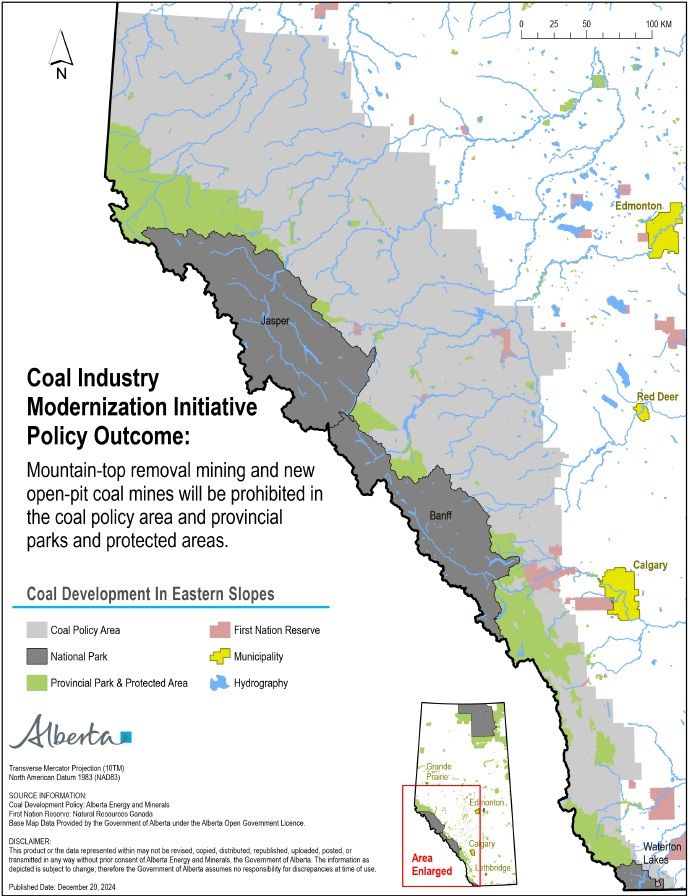
The minister said the province will not be pursuing thermal coal, which is used to heat homes, but metallurgical coal.
“What we’re talking about here is mostly metallurgical coal which is absolutely vital for the world for steel making.”
Minister Jean said they are still working on the CIMI and the final plan and “should be ready by next year.”


